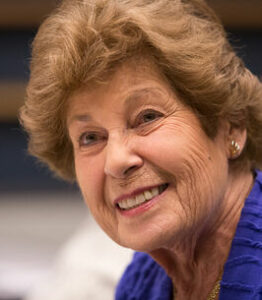Herta Baitch (née Griffel), a Holocaust educator who shared her story of survival with the United States Holocaust Memorial Museum and through her 2009 memoir, “Lucky Girl,” died on Tuesday, Jan. 30 at 90. She leaves behind her story of resilience in the face of unimaginable adversity for future generations as part of the museum’s online catalog.

Baitch was born in Vienna, Austria, in 1933, five years before Germany annexed Austria. Following the death of Baitch’s father, Wolf Griffel, in 1939, her mother, Beila Griffel, reached out to the German Jewish Children’s Aid organization in hopes of securing safe passage to the U.S. for her daughter.
After a year of waiting and compiling legal documents, Baitch was able to leave Austria with nine other children in 1940, but she had to leave her mother behind. One of the dresses Beila Griffel made for her daughter is now part of the U.S. Holocaust Memorial Museum’s collection.
In America, Baitch was taken in by a Jewish foster family, the Baers. She exchanged letters with her mother, but Beila Griffel’s letters would stop arriving in 1941.
“I wept with joy and thank our Almighty for having sent me so kind people who take such good care of my orphan child Herta,” Beila Griffels wrote in a letter to Baitch’s social worker, Rose Beser.
Later being placed with the Friedlander family, Baitch adjusted to life in the U.S. She married her husband, Arthur Baitch, in 1952, and they would go on to have three children.
“I will always be grateful that I have been privileged to live the life for which my mother so obviously prayed,” Baitch wrote in her 2009 memoir, “Lucky Girl.”
In 1963, she discovered that one of her mother’s cousins, Adela Dula, had survived the Holocaust and was living in London. The two were connected through the efforts of the Hebrew Immigrant Aid Society. When they finally met, Dula delivered a package to Baitch containing several family heirlooms, which Beila Griffels had sent to her before her death.
Baitch would learn her mother’s fate in 2004 through the efforts of Yad Vashem. On Sept. 14, 1942, Beila Griffels had been deported to the Maly Trostenets concentration camp in Belarus. She died four days later.
Later in life, Baitch became a Holocaust educator, speaking about her journey at schools, synagogues and museums. She told her story to the U.S. Holocaust Memorial Museum in 2016, and it is viewable in full on the museum’s catalog website.
On Baitch’s memorial page on Sol Levinson’s website, Rabbi Paul D. Schneider wrote of his experience working with Baitch and her husband to design a Holocaust memorial for Chizuk Amuno Congregation.
“When I think of Herta, I will reflect on her deep commitment to honoring the memory of the victims of the Holocaust, and of her dedication to her wonderful family and her loving community,” Schneider wrote.
She is survived by husband Arthur Baitch; children Larry Baitch (Sara), Daniel Baitch (Shelley Kramer) and Karen (Jules) Rosenberg; grandchildren SFC Colten Baitch (Shayna Baitch), Rabbi Asa Baitch, Adam Baitch, Casey Rosenberg, Evan Baitch, Ryan Baitch and Carly Rosenberg; and great-grandchildren Bayla Baitch, Naomi Baitch and Matisyahu Baitch. She is predeceased by parents Beila and Wolf Griffel.
Contributions may be sent to the United States Holocaust Memorial Museum, the Jewish Museum of Maryland or the charity of your choice.





